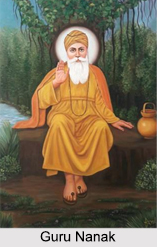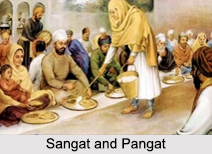 Guru Nanak Dev Ji is known as one of the most popular saints in India and also the youngest founder of Sikhism. Guru Nanak has established the religion of Sikhism in India and spread his idealism all over the world with the help of his disciples. He has followed almost all the methods like gentle persuasion, humour, sarcasm and even admonition to get his point across and spread the Sikh faith.
Guru Nanak Dev Ji is known as one of the most popular saints in India and also the youngest founder of Sikhism. Guru Nanak has established the religion of Sikhism in India and spread his idealism all over the world with the help of his disciples. He has followed almost all the methods like gentle persuasion, humour, sarcasm and even admonition to get his point across and spread the Sikh faith.
Early Life of Guru Nanak
Guru Nanak was born in 1469 in the village of Punjab. The village, now known as Nankana Sahib, is situated near the city of Lahore in present day Pakistan. His parents belonged to Khatri caste. His father Mehta Kalu was the Patwari of the village. From an early age, it was evident that Nanak was an extraordinary child, marked out with divine grace.
Life of Guru Nanak
After attaining the holy enlightenment, Guru Nanak started to spread his message among the common people. It was in 1496, Guru Nanak received a vision to preach the way of enlightenment and since then he started his mission of spreading a new outlook. He decided to tour as much of the areas as he could and travelled for 23 years in all the four directions from Sultanpur. He toured the major holy places of both the Hindu and Islam religions, like Kurukshetra, Haridwar, Ayodhya, Allahabad (historically known as Prayag), Pataliputra (presently known as Patna), Amarnath, Hinglaj, Ajmer, Multan, Mecca and Medina. A Muslim, Mardana accompanied Guru Nanak throughout his entire journey and this established the fact that Nanak never saw any differences between people from different religions.
When Guru Nanak completed his four journeys, he came back to Sultanpur and founded a new village named Kartarpur, the village of his wife`s parents. He started to live their along with his disciples. The village of Kartarpur quickly became a center for the faithful Sikhs.
Teachings of Guru Nanak
The teachings of Guru Nanak mirrored philosophical understanding of the omnipresence of the omnipotent.
He along with his disciples followed a particular routine everyday to recite the name of God. They would start the morning with the recitation of Japji and Asa di Vaar, and they would continue with their worldly duties after that. They recited Sodhar and Aarti in the evening. This was in fact a perfect setting for an ideal community in which the teachings of Guru Nanak were being practiced. The people in Kartarpur practiced the teachings like equality, brotherhood, charity, helping one another and contributing to the life of the community as a whole, while doing their other worldly duties.
 Nature of God
Nature of God
According to Guru Nanak, there is one God. He is supreme truth. He is the creator. He is omnipresent. He is not born. He is formless, unseen, infinite, inaccessible, inapprehensible and pure. His teachings are popular among his followers. His first statement after his prophetic communion with God was "There is no Hindu, nor any Mussalman". This is an announcement of supreme significance. It declared the brotherhood of man and the fatherhood of God.
Langar
Guru Nanak became successful to lay the foundation of a casteless society by starting the institution called Langar, with the active support of his wife, Mata Sulakhni. Nanak actually elevated the works like preparing meals, cleaning, cooking, serving and finally washing the utensils, to the level of service to the community.
Sangat and Pangat
The concept of Sangat and Pangat was also introduced by Guru Nanak as the means to fight against the caste system and inequality that was prevailing in the Indian society at that time. He successfully used these two aspects to spread his idealism among his disciples and also to establish his thoughts effectively. These two are considered as two of the most important and significant aspects of Guru Nanak`s teachings of Sikh faith.
After establishing an equal society in Kartarpur, Guru Nanak then started to look for his successor, who will be carrying his messages to the common people in the upcoming years. He was looking for successor, because he felt that there was still a lot to be done for his mission, as he had laid only the foundation of a new egalitarian faith, and set up a nucleus of a regenerated society. The society was still needed to be nurtured and guided and made stable and self-reliant. Guru Nanak found a devotee named Lehna among all the devotees, who came to Kartarpur and he was quite impressed with Lehna. Lehna also soon became an ardent disciple of Guru Nanak and actively took part in all activities of Langar. Guru Nanak examined the patience and devotion of his two sons, Srichand and Lakhmidas and also of Lehna by employing them in various laborious works, before finally selecting his successor. Nanak eventually selected Bhai Lehna as his successor and named him "Guru Angad" after passing him the responsibilities to take forward his mission. Thus, Guru Nanak founded the base of a religion that had travelled a long journey so far and is flourishing in its own till today.
Guru Nanak left his earthly abode on 7th September, 1539, at the age of 70.









